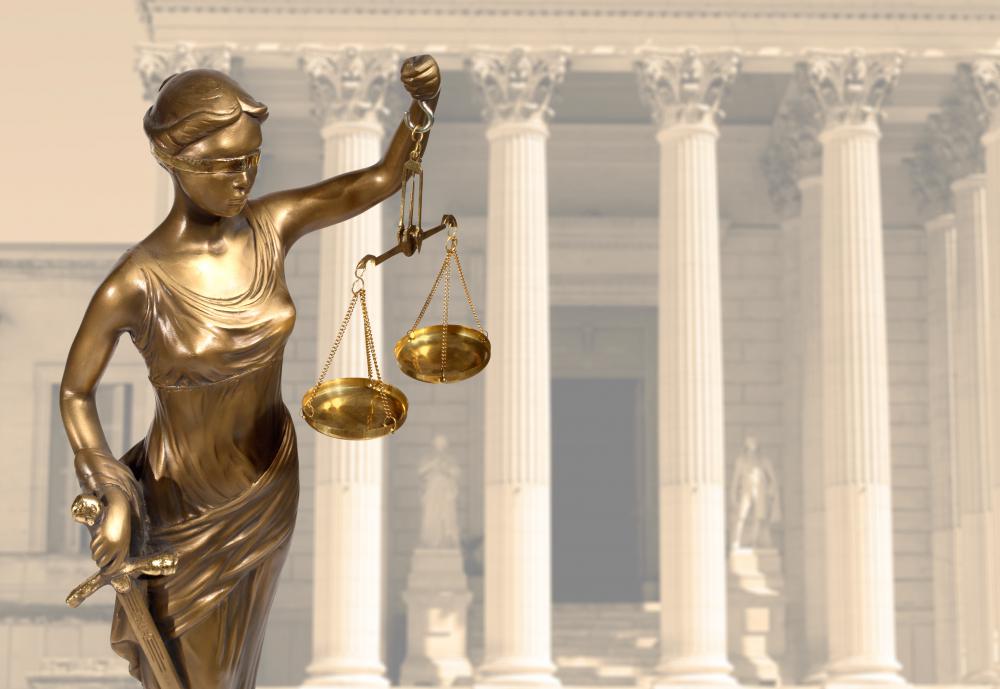At WiseGEEK, we're committed to delivering accurate, trustworthy information. Our expert-authored content is rigorously fact-checked and sourced from credible authorities. Discover how we uphold the highest standards in providing you with reliable knowledge.
What are Slander Laws?
Slander is oral defamation of character. Defamation is a civil offense that occurs when one party makes false and malicious statements about another to a third party. Many jurisdictions have slander laws that address this type of behavior and allow the harmed party to recover damages.
For statements made by one person about another to be considered slander, several circumstances must exist. To begin with, the statements must be conveyed to a third party. The law does not generally recognize the possibility of defaming a person to herself. Also, the statements must be false. No matter how private or hurtful a comment is, it is not illegal to say it if it is true.

Furthermore, if a person wishes to use slander laws to seek justice, she must be able to prove that the statements against her were made with malice. To do this, she must show that the accused had the intention to do harm. If someone makes false statements mistakenly and it hurts another person, this is not considered a malicious act and is therefore not slanderous.

These laws allow a person to sue for personal injuries in a civil court, because they recognize that a great deal of damage can be caused by defamation of character. A person may lose her job or have her business ruined because of false and malicious statements. She may suffer mentally and emotionally due to ridicule and difficulties created in her personal and social relationships.

Financial remedies, in the form of actual or punitive damages, may be awarded to a person who suffers from these or other hardships due to defamation. Before a person is awarded these damages, however, the accused has the opportunity to defend himself. One aspect of slander laws that vary from one place to another are the acceptable defenses. For example, in some jurisdictions, a person cannot be held liable for statements that can be identified as opinions.

There are certain other instances when false statements may be made about a person without the individual being subjected to legal consequences. For example, statements made to the subject in anger are not punishable even if a third party overhears. Generic statements made about groups, such as homosexuals, minorities, or an organization, do not give any individual from those groups the right to sue. Also, false statements made by lawyers, witnesses, or judges in a courtroom setting are excluded from slander laws.
AS FEATURED ON:
AS FEATURED ON:














Discussion Comments
A co-worker told a third party that I had committed an illegal act.
A co worker reported me to our boss saying I called him a lazy you-know-what to another work colleague who then reported this to him and he then reported me. I got pulled in and questioned but said 100 percent no I didn't say this. Where do I stand?
I worked for a flooring company which got my paycheck wrong every week for years. I work off of commission, and I finally had enough and tried to speak to upper management, only to be told month after month they would look into it.
After two years of continually having to chase my money down every month, I gave notice, the company accepted my notice that day, and I then filed a suit with the state law board to get them to investigate my claim.
They have and found money in the meantime I have received an offer to work for another company that services the flooring store where I worked, and was told today that I would lose money because the flooring store refused to let me service their company. Now this has cost me 10 percent of my earnings. Is there anything I can legally do?
Proving that something is "true" is on the burden of the person accused of defamation/libel. "Truth" is a defense in slander/libel, and like all defenses, the burden is with the accused. It is not the burden of the prosecution to prove that the slander/libel is false. The only thing the prosecution has to prove is that the statement harmed their client.
In a landmark case in 1981, the comedienne Carol Burnett successfully sued the National Enquirer after it claimed she’d appeared drunk at a restaurant with Henry Kissinger.
Carol_Burnett_v._National_Enquirer,_Inc.
Ms. Burnett never had to prove she was sober, or that any of the statements made by the Enquirer were false. She just had to prove that the Enquirer acted with actual malice, and that was accomplished.
I went to upper management because of an issue with a supervisor who was constantly nit picking and always condescending when we are talking. She always makes snide remarks about how I handle my job. She also has made unnecessary comments to other supervisors about me if I didn't follow her orders right away. She is just new to our department and basically learning about how we do our work. I have been working in the same department for three years (I've even received several employee of the month awards for doing an excellent job) and practically just following the proper procedures and documentation since my ID is linked to one of our equipment. So I really have to make sure that we are doing things properly because I am the one who is going to be held responsible if something happens that could result in our department paying fines.
I tried to explain that to my new supervisor but she thought that I am just being insubordinate towards her. She was very argumentative whenever I explained the proper process. Since I don't want my job to be jeopardized or get fired, I talked to the upper management and HR, hoping maybe they could enlighten her about the severity of her actions.
I tolerated her for almost four months and just kept walking away from her, but since I really do care about my job and don't want to cause the company some troubles, I went ahead and spoke to HR. I was hoping that HR and upper management could help me resolve this issue with my new supervisor. Unfortunately, when I took a day off, she ended up handing out some paperwork and asking my coworkers to make a negative statement towards me and that they had to sign it. My coworkers did not approve and did not know what to do since she is the supervisor and that they must follow her orders. I heard this from someone who witnessed this activity when I returned to work the next day. Since I am not the one who saw this, I could not just believe it or make any accusations or report her to the upper management. Whoever witnessed it needs to come forward and report her.
I don't really know what to do anymore since it seems that she is not happy with me for whatever reason, and that I will have to quit this job. Her behavior makes me not want to come to work. I recently have to call in sick because of her negative actions towards me.
For the three years that I have worked in this company, this is my second time to call in sick. I have to find another job and when you are working for 40 hours and you spend your time mostly with your coworkers (whether you like them or not) we have to get along with each other. Any advice on how I could handle this very sticky situation? I want to leave the job with no resentment. I hoped that I could still hang on until I get a new job.
I own a fast food take-away business and tonight had an irate customer who was annoyed at having to wait for his meal. Everyone who came in to order were told there wold be a 25-30 minute wait as we were extremely busy and can only cook so much.
He had ordered a fish burger, cheeseburger, fish, chips, chiko, dim sums. Once he got his order he phoned in a while later and abused my 15 year old staff member, saying his cheeseburger was too small and burned. He didn't ask to speak to management or anyone in charge. He just abused the person who answered the phone.
I then went home and was messaged from a friend about a post that has been plastered on facebook with a picture of a burned burger bun with the statement of 'This is the burnt burger I received tonight from [company name]' and then obviously loads of people commenting on their disgust. I took a look at this picture and I will guarantee the guy burned it fully at home before taking this photo, as his burger did not leave our shop in that state.
What can I do about this? He has slandered my business, named my business and put up false pictures to back up his story. Can I sue him for slander?
@anon329221: I've got nearly 21 years at a newspaper under my belt, so I know something about libel laws. As long as you do not mention the church or any individuals by name, you can discuss the circumstances.
For instance, you can say, "When I attended a particular church, some members acted in various ways that caused such-and-such to happen." Merely saying something is true (if you mention real names) is not sufficient to remove the libel threat. Libel may be true. Slander may be true. The point is whether saying it without corroboration (like in a lawsuit where a decision has been rendered) does damage to someone's reputation.
You can certainly talk about the situation as long as you don't give real names, just the circumstances.
I own a blog. If I speak out against a church or organization because of my personal experience with them (yet am truthful about the events), is this considered libel or slander? They are briefly mentioned in the events of a divorce.
Every week for the past two months, I have been defending myself from a few co-workers. One is small and thinks I'm going to "get them" and I do not understand this. The other tried to convert me to a religion that is not my faith and they say I am harassing them. They are threatening to "tell" on me for nothing. What do I do? I am not bothering anyone. I'm a tall, bigger built person and the small person (we are both female) I think may have lesbian tendencies. I am straight. In fact, she touched me, and says they think I'm going to get them, like implying that I am going to possibly harm them. What can I do? This is at work.
I am president of a Home Owners Association. The ex-president of the HOA warned me not to slander her to the members or she will sue me. What I said in email to all members of the HOA was the ex-president did not share with us the info she was two years delinquent with her HOA fees. She only shared that knowledge with one member of the board who herself was one year delinquent with fees. They kept it to themselves, and no financial records showed it because they had no financial records at all due to poor bookkeeping.
There were three board members at the time. I uncovered the delinquent accounts when I analyzed the past bank statements of the HOA. Is suing me for slander legit here? Is this a case of hurt feelings, of being embarrassed?
I have just been terminated for another employee saying that I looked like I was under the influence of drugs. It was the first day I had came back after having my wisdom teeth taken out, so I had taken pain meds the night before. However I was only running a fever from the trauma of the operation and felt sick.
The employer decided to tell the owner that i was so "so high" I was nodding off in the breakroom on lunch. They called me into the office and terminated me without a second thought. I have never missed a day and have a perfect work record. I even offered to take a drug test and none of that interested them. Would this be considered slander? Is there anything I can do other than beg for my job back?
About five months ago, I got a graveyard lead position with the company I work for. I was good buddies with a coworker whom I worked with on swing shift.
For some reason, he told his lead that I brought my gun to work and it was in the back pack that I had with me. This lead told a supervisor who then wrote it to my manager in an email.
I had two supervisors talk to me the same night and looked through all my things to find nothing. I almost lost my job because of this. Now this coworker seems to always have a problem with me or the work that I do. He tells me as a pass down that my bosses told him to tell me to do things that are not true. I have to talk to my manager daily to combat his lies. Now my manager says it is a dead subject, but I'm still having to go to work and deal with something new every day.
What can I do now to make all this go away for good without losing my job?
@Mutsy - I think that the tabloids get away with saying the things they say because a lot of times there is an element of truth. According to the libel and slander laws the information must be false in order for it to be considered slander or libel. If you say something about someone that is negative but true, there is no slander.
However, if you spread rumors about a coworker in order for that coworker to get fired then that is slander because not only were you telling lies about the person, but you had malicious intent which was to get the person fired.
I know that a lot of celebrities do not prosecute tabloid newspapers for violating slander and libel laws because they don’t want to draw attention to the magazine and spike of their sales.
They also know that these types of cases are difficult to prove and often the judgments when there is a winning case are very small. This is usually why celebrities stay away from pursuing law suits. In fact the only celebrity that I can remember that sued the tabloids successfully was Carol Burnett.
She was accused of drunken misconduct in a restaurant and she sued for libel because not only was this not true but Carol Burnett had a sensitivity to alcohol because both of her parents were alcoholics. She donated a portion of the proceeds of her judgment to the University of Hawaii’s school of journalism for more law and ethics classes.
Post your comments